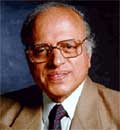|
 Chennai:
The money that the government saved by reducing the
fertiliser subsidy should be ploughed into research in
improving the soil health to reap long-term benefits,
says renowned agricultural scientist M S Swaminathan. Chennai:
The money that the government saved by reducing the
fertiliser subsidy should be ploughed into research in
improving the soil health to reap long-term benefits,
says renowned agricultural scientist M S Swaminathan.
Calling
for a soil health enhancement movement, Swaminathan advocates
setting up more laboratories for testing micronutrients
like zinc and boron and the issue of Soil Health Cards
to farmers. “Thus, the efficiency of the use of nutrients
can be greatly enhanced, thereby reducing the quantity
of urea, DAP and other mineral fertilisers needed for
high yields.”
Welcoming
the budget unveiled by Finance Minister Jaswant Singh,
he says funds are also needed to promote organic farming.
“Our agricultural competitiveness needs to be enhanced
very considerably and this calls for major additional
investment. This is why I feel that any money saved from
the support to farmers should be utilised to assist farmers
to improve productivity, profitability and sustainability
of agriculture.”
On
the emphasis given in the budget to greenhouse horticulture
and precision farming, Swaminathan says diversification
is essential for value addition to the time and labour
of rural women and men.
“The
economic survey points out that we are entering an era
of jobless growth since the rate of growth of employment
on the current daily status has declined from 2.7 per
cent per annum (pa) in 1983-1994 to 1.07 per cent pa in
1994-2000. Much of the employment growth has to take place
in the farm sector. Farming systems diversification and
value addition are essential for promoting job-led economic
growth,” he adds.
Hi-tech
horticulture involves cultivation of vegetables, fruits
and flowers under greenhouse conditions using fertigation
techniques of feeding the plants. Fertigation implies
mixing nutrients with irrigation water and delivering
it through a drip irrigation system.
“Precision
farming involves giving inputs at the right time and in
right quantity. This will lead to the more efficient and
economical use of macro- and micronutrients and plant
protection chemicals,” he sums up.
|